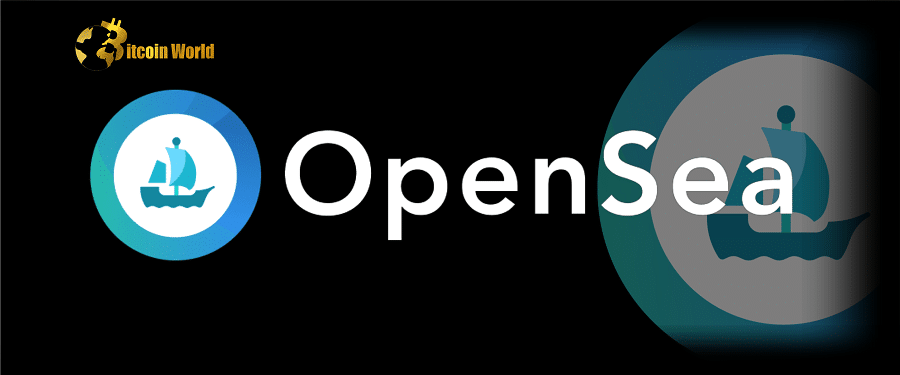Is OpenSea, the leading NFT marketplace, losing its way? Amidst constant policy shifts and what users are calling ‘haphazard’ verification processes, the platform is facing a wave of criticism. From sudden account disabilities to flip-flopping on creator royalties, the NFT giant is navigating turbulent waters. Let’s dive into the heart of the controversy and see what’s riling up the NFT community.
Verification Chaos: Who Gets the Blue Tick and Why?
Imagine building your digital art collection for years, only to find your account suddenly disabled without explanation. This is the reality for some OpenSea users who are now voicing their frustration over the platform’s seemingly arbitrary verification system.
- Sudden Account Disabling: Users like nirozin report having their wallets disabled after significant trading history on OpenSea, with no clear violation cited beyond a generic ‘terms of service’ breach.
- Lack of Transparency: The OpenSea Customer Experience team’s responses are described as vague, offering no specific reasons for account actions, leaving creators in the dark.
- Verification Obstruction: Smaller creators feel they are being unfairly targeted, with some claiming the ‘request verification’ button has been manually removed for their collections, hindering their visibility and credibility on the platform.
This lack of clarity and perceived inconsistency in verification is breeding distrust within the OpenSea community. Why are some accounts seemingly fast-tracked to verification while others, even with substantial activity, are facing roadblocks or sudden bans? This question is echoing across crypto Twitter and NFT forums.
The Royalty Rollercoaster: Are Creator Fees Safe?
The verification issues are just one part of the story. OpenSea has also been under scrutiny for its evolving stance on creator royalties – a critical element for NFT artists who rely on secondary sales for continued income. Let’s break down the recent developments:
- Flip-Flopping on Royalties: OpenSea’s recent history includes a back-and-forth regarding enforcing creator fees, creating uncertainty and anxiety among NFT creators.
- CORI and the ‘Operator Filter’: In a move to solidify royalty enforcement, OpenSea is handing over control of a blocklist of marketplaces that don’t respect creator fees to the Creator Ownership Research Institute (CORI). This collective includes major players like Nifty Gateway, Zora, Manifold, SuperRare, and Foundation.
- The Royalty Registry: CORI supports the Royalty Registry, an on-chain system designed to ensure royalties are correctly distributed. This aims to streamline royalty payments for creators across participating marketplaces.
What is the ‘Operator Filter’? It’s a tool introduced by OpenSea that allows marketplaces to block platforms that don’t enforce creator royalties. CORI will now manage this filter, aiming for industry-wide royalty protection.
Is OpenSea Forming a ‘Cartel’? User Concerns Emerge
While OpenSea frames these actions as essential for protecting creator income, not everyone is convinced. The formation of CORI and the control over the ‘Operator Filter’ are raising eyebrows, with some users expressing concerns about a potential ‘cartel’ forming within the NFT space.
User Concerns:
- Centralized Control: Critics argue that handing over control to a marketplace-dominated collective concentrates power, potentially stifling innovation and competition.
- Artist Representation: The lack of direct artist control within CORI is a point of contention. Some believe respected artists should have a more significant role in shaping royalty policies, rather than marketplaces dictating terms.
- Market Manipulation Risk: The fear is that this ‘cartel’ could enforce unpopular features across the board, limiting choices for users and potentially harming smaller marketplaces outside the collective.
One user aptly summarized the sentiment by stating it would be “better if it was controlled by respected artists rather than marketplaces,” highlighting the desire for more creator-centric governance in this crucial aspect of the NFT ecosystem.
OpenSea’s Stance: Protecting Creator Fees in a Competitive Market
OpenSea defends its actions by emphasizing the “existential imperative for the space to preserve creator fees.” They argue that consistent royalties are vital for the long-term sustainability of NFT creation and artist livelihoods. However, this move comes at a critical juncture where NFT marketplaces are fiercely competing for market share.
The Balancing Act:
- Market Share vs. Creator Support: OpenSea, like other platforms, is caught in the tension between maintaining its dominance and supporting creator royalties. Experimenting with different policies can be risky and potentially alienate users.
- $1 Billion for Creators: OpenSea highlights its significant contribution to creator earnings, stating that creators on the platform earned over $1 billion in 2022 from secondary sales royalties alone. This underscores the platform’s role in the NFT creator economy.
- Ethereum’s Leading Marketplace: Despite the controversies, OpenSea remains the most popular Ethereum NFT marketplace, indicating its continued influence and user base within the NFT space.
The Road Ahead: Navigating Trust and Transparency in the NFT World
OpenSea’s recent policy shifts and user backlash highlight the ongoing challenges in the evolving NFT landscape. Balancing creator compensation with marketplace competitiveness, ensuring fair verification processes, and fostering trust within the community are critical issues that need careful navigation.
As OpenSea and CORI move forward with their royalty enforcement plans, the NFT community will be watching closely. Will these measures genuinely protect creators and foster a sustainable ecosystem, or will they lead to further centralization and stifle innovation? The answers will unfold as the NFT space continues to mature and grapple with these complex dynamics. One thing is clear: transparency, open communication, and genuine creator-centric policies are more crucial than ever for the future of NFT marketplaces like OpenSea.
Disclaimer: The information provided is not trading advice, Bitcoinworld.co.in holds no liability for any investments made based on the information provided on this page. We strongly recommend independent research and/or consultation with a qualified professional before making any investment decisions.




